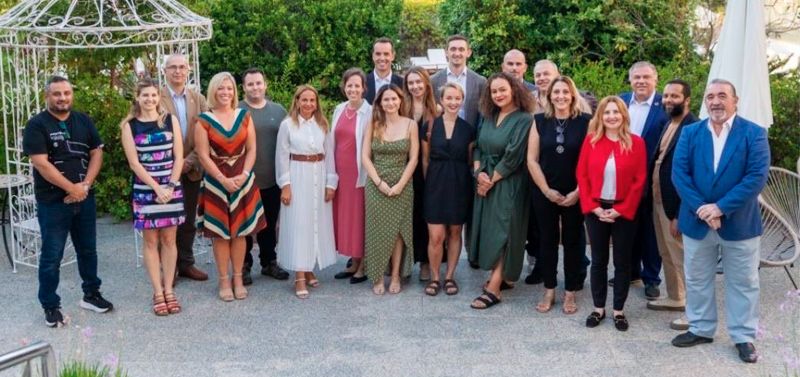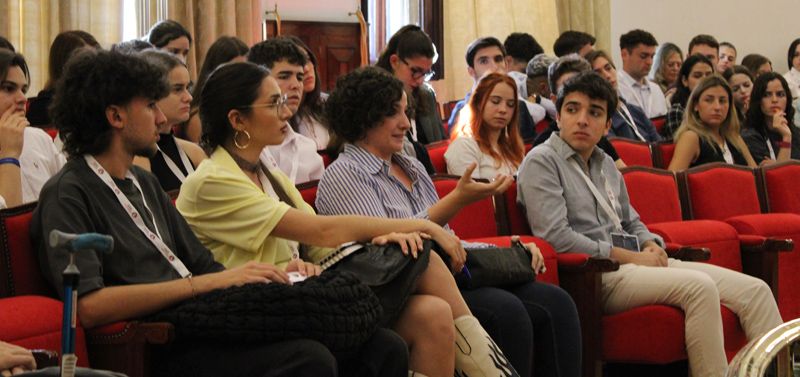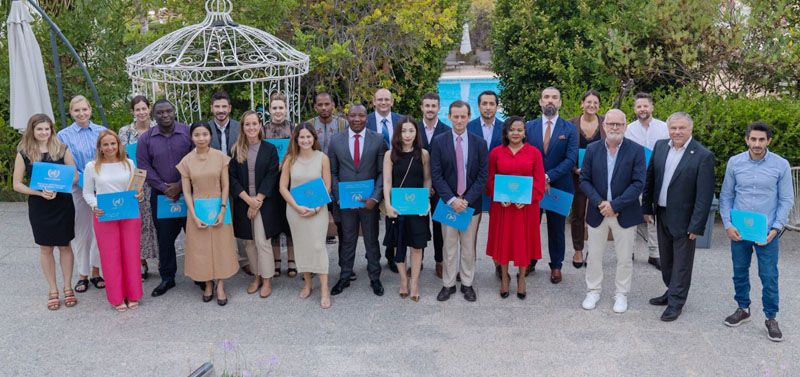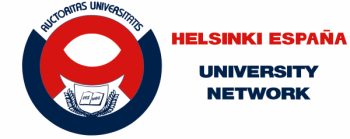
Nov 8, 2024 | Heat
From Helsinki España, we would like to extend our sincere gratitude to Operation Bless and Remar SOS for trusting us to deliver comprehensive security training to their staff. Over the course of five intense and hands-on days, participants had the opportunity to engage in practical learning designed to improve their ability to handle high-risk situations in hostile environments. We would also like to extend a special thanks to Escuela de las 3 Armas for their outstanding team of professionals, as well as Antonio de Dios González, our expert psychologist, and the experienced instructors from Auto Rescate 4×4, who all played a crucial role in making this training a success.
Throughout the course, participants covered a broad range of critical topics, including basic life support and first aid, secure information handling, map reading and GPS navigation, and 4×4 convoy driving. The training also focused on stress and risk management, safety in crowd and riot situations, and practical hostage survival techniques, all of which are essential for ensuring safety and operational effectiveness in challenging and unpredictable environments.
We are proud to have had the opportunity to help strengthen the capabilities of these dedicated professionals, and we look forward to continuing our work in supporting those who operate in high-risk settings.
For more information or inquiries about future training programs, please email: iucpm@helsinkiespana.org

Oct 10, 2024 | Education
For the third consecutive year, Helsinki España, in collaboration with the Ministry of Defense and the Spanish Agency for International Development Cooperation (AECID), has organized the UN OCHA (United Nations Office for the Coordination of Humanitarian Affairs) civil-military cooperation course in the municipality of l’Alfàs del Pi. This course is designed to improve coordination between civilian and military actors during humanitarian emergencies, a crucial task to ensure an effective and unified response in crisis situations.
Over the span of a week, 22 professionals from the United Nations Office for the Coordination of Humanitarian Affairs (OCHA), the Spanish Ministry of Defense, and AECID participated in an intensive training program addressing the key challenges of coordination in humanitarian operations. The course covered essential topics such as communication management during emergencies, planning and executing on-the-ground interventions, and the critical role of maintaining neutrality and independence in humanitarian assistance.
Held in l’Alfàs del Pi, the course received support from local authorities. The closing ceremony was attended by councilwoman Isabel Muñoz and Rocío Guijarro, representing the l’Alfàs del Pi municipality, as well as María Jaén, President of Helsinki España, and Ángela Suárez, Secretary General of the association. They emphasized the importance of these trainings in ensuring that both civilian and military actors can work together effectively during crises, optimizing the delivery of aid and protecting those affected.
Helsinki España would like to extend its heartfelt thanks to the City Council of l’Alfàs del Pi for their continued support and collaboration in making this course possible. Each year, this training provides valuable tools to professionals dedicated to humanitarian aid, strengthening their capacity to intervene in emergency situations and improving the international humanitarian response.

Oct 10, 2024 | Education, Human Rights
“Challenges and Threats to International Security: Building Critical Thinking from the University” is an event funded by the General Secretariat for Defense Policy of the Ministry of Defense. Its objective is to enhance knowledge about current challenges and threats to international security, encourage analysis and critical thinking, and engage young people in key issues in today’s international security. The sessions will be led by representatives from the Ministry of Defense, the Higher Center for National Defense Studies, the Spanish Institute for Strategic Studies, and security experts.
If you’re interested in delving into the major global threats that jeopardize peace and international security, understanding the impact of disinformation on contemporary democracies through the use of social media, and learning about the risks associated with new hybrid warfare strategies, you shouldn’t miss this activity.
With a duration of approximately 5 hours, there will be three sessions led by experts, followed by one university debate session. The project focuses on fostering critical thinking to enhance the analytical and argumentative abilities of the participants. To achieve this, at the end of the event, different groups will be formed among the attendees to discuss issues previously raised during the event.
The event will take place on Wednesday, October 23rd, from 08:30 AM to 02:00 PM at the University of Nebrija.
Register here or via email at iucpm2@helsinkiespana.org

Oct 17, 2023 | Education, Human Rights
With the diploma presentation ceremony, the course on civil-military cooperation by OCHA, the United Nations Office for the Coordination of Humanitarian Affairs, has come to an end for the second consecutive year in l’Alfàs del Pi. This event was organized by the Helsinki Spain association, the Ministry of Defense, and the Spanish Agency for International Development Cooperation (AECID).
Over the course of a week, 24 individuals were trained in organizing civil-humanitarian coordination actions in emergency situations.
The United Nations Office for the Coordination of Humanitarian Affairs is the UN Secretariat’s arm responsible for mobilizing and coordinating the response of humanitarian actors to emergencies.
OCHA’s responsibilities after a disaster, at the request of the affected country, include assessing needs, forwarding requests for humanitarian aid funding to other agencies, organizing donor meetings and monitoring mechanisms, overseeing the status of contributions made in response to requests, and providing reports as events unfold.
From the l’Alfàs del Pi City Hall, the Councilor for Association Relations, Patrick de Meirsman, expressed gratitude to Helsinki Spain for hosting this course in the municipality for the second year, where experts in international humanitarian assistance in emergency situations are trained. De Meirsman attended the closing ceremony, held at a hotel in l’Alfàs del Pi, alongside María Jaén and Ángela Suárez, representatives of the Helsinki Spain association.

Jun 28, 2021 | Human Rights, REACT
Faced with the risks and threats to International Peace and current conflicts, more than twenty people of different nationalities met in Alicante and later in Segovia, to make possible the XXV edition of REACT- Rapid Expert Assistance and Co-operation Teams- , a five-week training program on peace processes and conflict prevention, organized by the Helsinki Spain Association.
Rapid Expert Assistance and Co-operation Teams (REACT), was created in 2003 by the Organization for Security and Cooperation in Europe (OSCE) and organized by the Helsinki Spain Association, with the aim of preparing professionals with various interested career paths in improving their knowledge in conflict prevention, crisis and post-conflict management, rehabilitation and development, as well as their practical skills for field work in international peace operations.
It is an initiative composed of 7 modules that was born to provide participants with the knowledge and skills necessary to understand and analyze the main threats to international security and peace, the situations in which armed conflicts arise, their key actors and its impact on civilians. Likewise, it is intended to improve the capacities of the participants in the prevention, management and resolution of conflicts, as well as the protection of civilians in armed conflicts and, to strengthen the competence and confidence of the members when dealing with risk situations and / or criticism effectively, as would happen in peacekeeping work.
Throughout the 25 editions of the course, there have been experts from international organizations (United Nations, European Union, OSCE and NATO), diplomatic personnel and other officials, as well as military and police personnel, members of the International Committee of Red Cross and other humanitarian NGOs, as well as independent consultants and staff from different international universities.
On this occasion, the 25th Edition of REACT composed of twenty-two participants from; Colombia, Spain, Nigeria, Mexico, Argentina, Ethiopia, Cameroon, Togo, Lebanon, the Philippines, Canada, Jordan, Italy, France, China and Liberia has taken place in L’Alfas del Pi, in Alicante, in collaboration with the councils of Cooperation and Volunteering, Residents and Equality of the City Council. Until June 26, the program has been developed at the Platja Social Center, where six of the seven modules based on training in conflict prevention and peacebuilding, international law, protection of civilians, current conflicts and threats to peace were included. and international security, key actors and their contribution to international peace and security and tools for sustainable peace.
The seventh and last module called Hostile Environment Awareness Training (HEAT) is taking place in Los Angeles de San Rafael, Segovia, from June 27 to July 2, thanks to which, students participate in simulations to learn to deal with risks partners and other critical or emergency situations during mission deployment, such as team members in an international field operation. The HEAT content covers skills and competencies on how to act in the event of kidnapping, hostage-taking and encounters with weapons, mines and explosives; through the acquisition of knowledge about first aid in hostile environments and orientation and communication in the field; to driving an SUV and defending against chemical, biological, radiological and nuclear weapons.
REACT is the only training course of these characteristics that takes place in Spain and to date it has trained more than 400 people. Throughout its 25 editions, the Helsinki Spain Association has worked under the conviction of the transformative power of education and the need to train people from all kinds of countries and situations in conflict prevention, crisis management and post-conflict, as the best instrument at our disposal to contribute to the global efforts for the construction of Peace.





